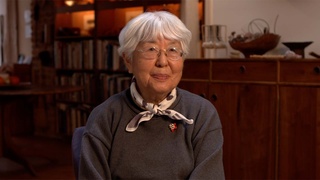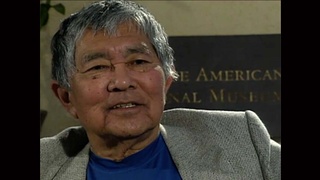Interviews
Experiences during World War II
I*: And then, and then did you, did you go to, were you evacuated to go into Hastings Park? When they --
I was not in Hastings Park.
I: You didn't go into Hastings Park?
Never went to Hastings Park.
I: Oh, and where did you go then?
From the home right to ghost town. To... where was that? To Slocan. From Slocan I went to... no, because we had a home in Vancouver. Lot of people came out to Vancouver without a home. They were shipped out to, like, where was it? Hastings Park. But we had no second home to go to, so they kept us where we stayed. Not a good place, but...
I: So you stayed at the home, and then from there, you went directly to Slocan?
Yes. Where we were, we got a room on Powell Street, rooming house. I: And then, and when you were in Slocan, what, what did you do in Slocan? Another job. Another sales job, 'cause they have to have stores.
I: So you were working in a store?
Store, yeah.
I: And how, how did you find the internment camp?
Huh?
I: How did you find the internment camp, the housing and the food?
Oh, they, they sent you there. You were allotted to one place, you know.
I: And did your family go with you?
Yes.
I: Your father and mother?
Mother, uh-huh.
I: The father went, too, with you?
Uh-huh, at that time, 'cause all the younger fathers were shipped away. It was our old... well, in fact, I had no father. It was my, my brother-in-law, which was, who was my brother-in-law?
Female voice: You were with your brother.
Huh?
Female voice: Weren't you with your brother?
I: Was your brother, was your brother --
No, my brother was old, I mean, he was, he was not allowed to go to a house. It was these old men over sixty or young kids. Yeah.
*"I" indicates an interviewer (Peter Wakayama).
Date: December 2004
Location: Canada
Interviewer: Peter Wakayama
Contributed by: Sedai, the Japanese Canadian Legacy Project, Japanese Canadian Cultural Center
Explore More Videos

The lack of discussion about family’s incarceration in Amache
Sansei judge for the Superior Court of Los Angeles County in California


Her brother’s reasons as a No-No Boy
(b. 1923) Japanese American poet, activist

Her grandfather was pressured to teach Japanese
Sansei judge on the Superior Court of Los Angeles County in California

Neighbor took care of her mother after grandfather was taken by FBI
Sansei judge on the Superior Court of Los Angeles County in California

Immediately after the bombing
(b. 1938) Japanese American. Hiroshima atomic bomb survivor

Other family members not as lucky
(b. 1938) Japanese American. Hiroshima atomic bomb survivor

His parents had little hope that he had survived the atomic bomb
(b. 1938) Japanese American. Hiroshima atomic bomb survivor

His views on nuclear weapons
(b. 1938) Japanese American. Hiroshima atomic bomb survivor

Loss When Leaving for Manzanar
Japanese American animator for Walt Disney and Hanna Barbera (1925-2007)

Forcibly deported to the U.S. from Peru
(b. 1936) Japanese Peruvian incarcerated in Crystal City

Stories of Grandfather at a concentration camp in Fusagasuga
(b.1974) Japanese Colombian who currently resides in the United States

Her grandfather in a concentration camp in Fusagasuga (Spanish)
(b.1974) Japanese Colombian who currently resides in the United States

Family welcomed at Crystal City
(b. 1936) Japanese Peruvian incarcerated in Crystal City

First meal at Crystal City
(b. 1936) Japanese Peruvian incarcerated in Crystal City
